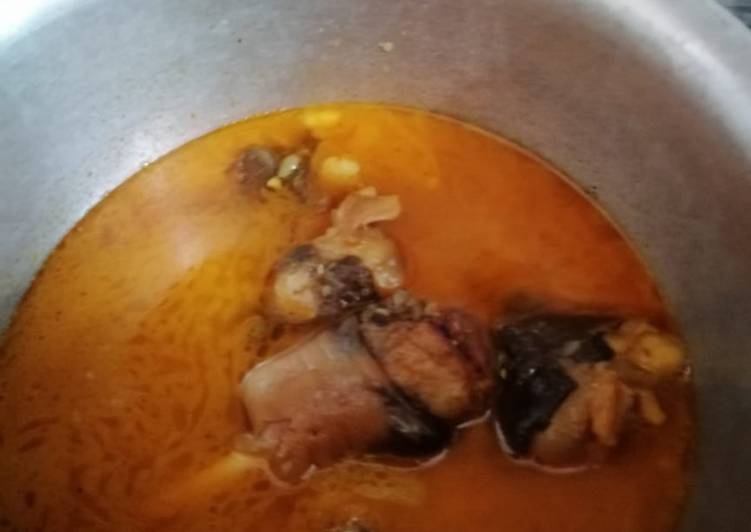Desi mutton paye. Paye is one of the popular Pakistani Food Recipe that is serve in breakfast, but also go delicious in lunch and dinner. This is tried and tested desi mutton paya recipe or trotters curry with a perfect mouthwatering taste. Learn how to make best Mutton Paye Recipe, cooking at its finest by chef at Masala TV show Lively Weekends.
 Special guests are also treated with desi paaye.
You can make desi paaye from beef, mutton or lamb too.
Heat oil in a pot over medium heat.
You can cook Desi mutton paye using 12 ingredients and 4 steps. Here is how you achieve it.
Special guests are also treated with desi paaye.
You can make desi paaye from beef, mutton or lamb too.
Heat oil in a pot over medium heat.
You can cook Desi mutton paye using 12 ingredients and 4 steps. Here is how you achieve it.
Ingredients of Desi mutton paye
- It's 4 of trotters.
- You need 2 tsp of Salt.
- Prepare 1 tsp of Turmeric.
- You need 1 tsp of Red chilli powder.
- You need 4 of Onion.
- It's 3 tsp of Garlic.
- You need of Oil half cup.
- Prepare of Water as required.
- You need 3 of Big alaichi.
- It's 4 of Green cardamon.
- You need of Cinnamon stick 1.
- You need 1 tsp of Zeera.
Add whole spices, ginger garlic paste, chili powder, coriander powder, turmeric, salt, fry well. Add yogurt, fried onion and paye, cook well for few minutes or until oil comes on top. See more ideas about nihari recipe, slow cooked meat, recipes. Try out all the recipes by shireeen anwar ranging from desi recipes to chinese recipes.
Desi mutton paye instructions
- Wash the trotters and boil in water 5 to 7 minutes and discard the water.
- Add water in trotters and boil again add salt turmeric and chilli powder and wait for dry water.
- When the water is dry add oil green cardomon black cardomon beers cinnamon stick and bhonai.
- Add 3 glass of water when the water is half dry the trotters is ready.
Shireeen anwar is awe-inspiring, rarest and unique cooking expert. Paya is a traditional food from the Indian Subcontinent. It is served at various festivals and gatherings, or made for special guests. The main ingredients of the dish are the trotters (or hoof of a beef, goat, buffalo or sheep); cooked with various spices. Desi are the people, cultures, and products of the Indian subcontinent and their diaspora, derived from Sanskrit देश (deśá), meaning "land, country." Although "desi" is sometimes viewed as a loose term, and countries that are considered "desi" are subjective, it is accepted that the desi trace their origin specifically to the countries of India, Pakistan and Bangladesh.